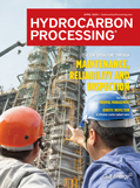Loss Prevention
Accelerating the transition to renewable fuels
The global push to neutralize carbon-based GHG emissions by 2050 not only holds great promise for the future of the planet, but it also stands to create millions of jobs, spur rapid growth and drive technological innovation.
Why sulfur plants fail: An in-depth study of sulfur recovery unit failures—Part 1
Equipment malfunction or an unplanned shutdown of a SRU can have a significant effect on a production company’s profitability, along with an equally serious impact on personnel safety and the environment.
Sustainable steel/chemicals production: Removal of impurities for valorization of steel mill gases
Industry faces significant challenges relating to the transition toward cleaner energy and more sustainable feedstocks.
IRPC 2022: Tackling the dual challenge through AI enabled advanced control
Alex Kalafatis, Senior Director, Product Management for Aspen Technology delivered a presentation titled, “Tackling the Dual Challenge through AI Enabled Advanced Control and Optimization,” at IRPC 2022 in Houston, Texas.
History of the HPI: The 2000s: Net-zero, environmental regulations, capacity acceleration and digital transformation
This final installment of the History of the HPI series details major events in the refining and petrochemicals industry over the past 20 yr, including stricter regulations/initiatives to curb carbon emissions, a safer and more environmentally friendly way to produce and handle chemicals, significant capital investments to boost production capacity and digital transformation.
Evaluate options for decarbonizing petroleum refineries
The energy transition requires rebuilding the energy supply infrastructure for a lower-carbon economy and renewable energy generation for industry and transportation that run more on electricity and hydrogen and less on fossil fuels and provide a circular path for consumer plastics. The growth in global oil demand is predicted to end within 10 yr, but it is still too early to foresee a rapid decline in that demand.
Environment and Safety: Gas flaring: Necessary, or a waste of resources and a source of greenhouse gases?
Flaring is the controlled burning of hydrocarbons at oil refineries, gas processing plants and petrochemical plants.
Optimization: Integrity operating windows management
Operations in the oil and gas, petrochemical and refining industries pose a higher risk when failures occur in identifying ongoing damage mechanisms within static equipment.
Process Control, Instrumentation and Automation: Distillation column DCS control configuration
Is there a consensus about a distillation column distributed control system (DCS) control strategy? Much has been written about this topic, covering configuration possibilities, constraints and interacting control considerations.
Advanced cleaner technology: Leveraging tailored solutions for reliability goals
Operators at refineries, petrochemical plants and power generation companies are under constant pressure to reduce maintenance and operational costs, boost productivity, minimize risk of unplanned outages and maximize time between overhaul periods.

- Holland America starts pilot tests using renewable fuels on cruise liner 5/3
- U.S. admin sets path for ethanol aviation fuel subsidies 5/3
- Ryazan refinery (Russia) hit by drone strike 5/3
- Novatek's new Ust-Luga condensate unit set for June testing 5/3
- Thiozen pilot successfully produces zero-emission H2 from sour gas waste streams 5/3
- Mexico's Pemex exported 20,000 bpd of crude, fuel to Cuba in H2 2023 5/3




